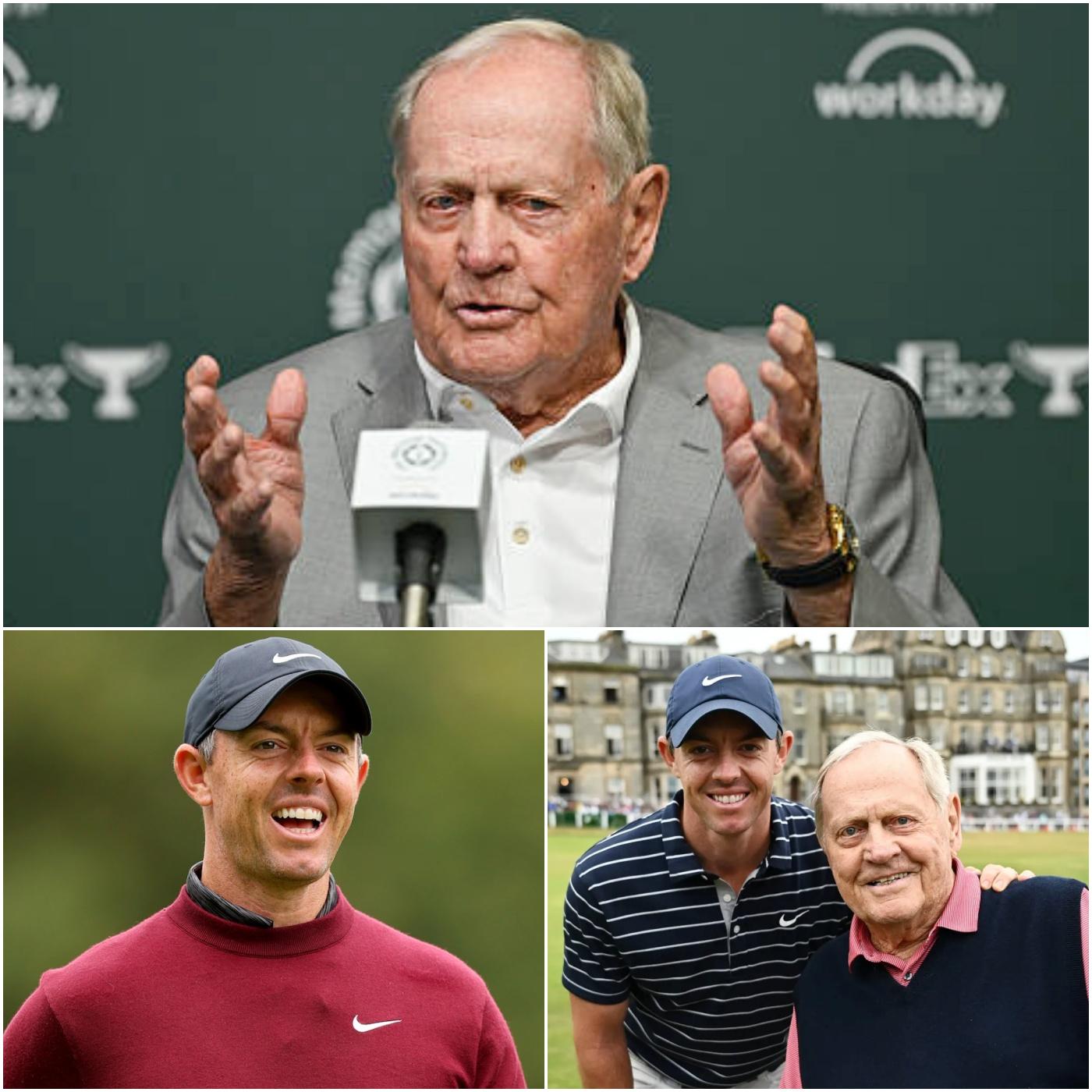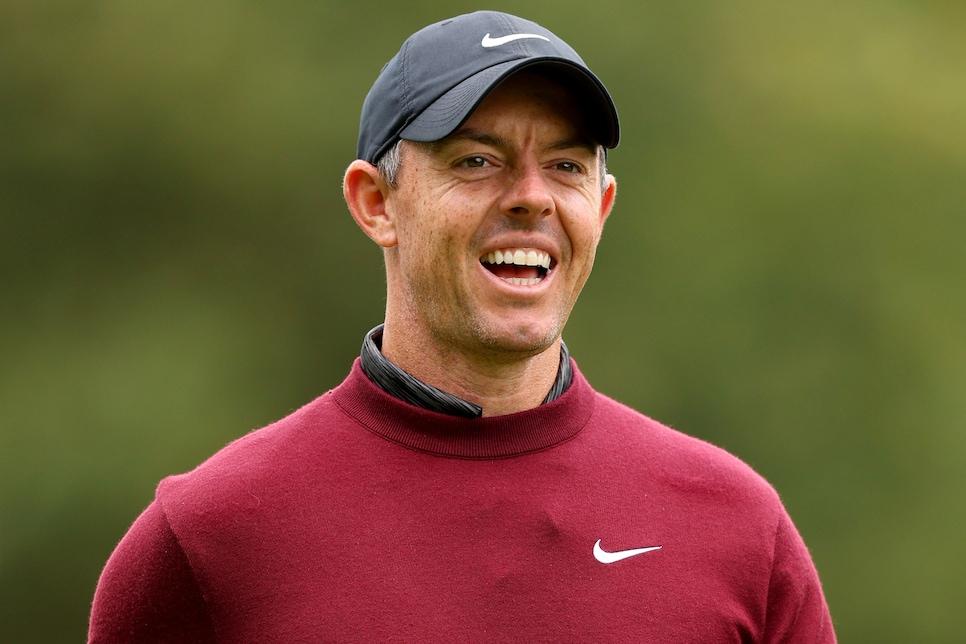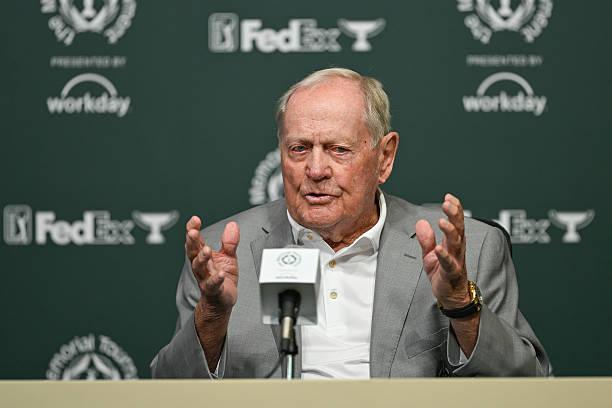Golf legend Jack Nicklaus has stunned the golf world with his recent remarks about Rory McIlroy. The iconic figure described the treatment of McIlroy as a “crime against golf,” shocking fans and analysts alike.

Nicklaus emphasized the immense pressure McIlroy carries as a representative of America, asking, “How can anyone be so cruel as to abandon a 36-year-old man carrying the pride of America on his shoulders?” His words immediately drew global attention.
The statement sparked widespread discussion on sports networks and social media. Fans debated whether Nicklaus’s comments were appropriate, while many praised him for defending a contemporary golfer facing intense public scrutiny.
Nicklaus also issued a concise 12-word warning that left the golf community stunned. Analysts dissected the statement, speculating about its intended audience and the broader implications for the sport and those criticizing McIlroy.
Within moments, the alleged culprit responded publicly. Their reply was measured yet assertive, defending their actions and prompting a heated debate that captured the attention of fans and media alike.
Social media quickly flooded with reactions, with fans praising Nicklaus’s defense of McIlroy while demanding accountability from critics. The incident became a trending topic worldwide, dominating conversations in both mainstream and online media.

Experts noted that Nicklaus’s timing was significant, potentially influencing McIlroy’s public image and reinforcing his standing amid negative attention. The support of a legend could serve as both morale boost and public vindication.
Sports psychologists weighed in, suggesting that public backing from a respected figure could improve McIlroy’s emotional state, helping him manage stress and refocus on his performance during upcoming competitions.
The culprit’s response added complexity, acknowledging certain criticisms while defending their position. Analysts debated the ethics and responsibilities of public commentary, emphasizing the impact of words on professional athletes.
Commentators highlighted the generational contrast, noting that Nicklaus’s stature allows him to speak with authority and influence, demonstrating the weight of defending a contemporary athlete facing scrutiny.
The episode sparked broader discussions about sportsmanship, respect, and empathy. Experts emphasized that competitive success should not justify cruelty or abandonment, reinforcing the importance of ethical treatment of athletes.
Fans and media outlets highlighted the role of social media in amplifying controversies. Nicklaus’s intervention demonstrates how influential voices can counter negative narratives and shift public sentiment.
The situation has prompted conversations about mental health in sports, stressing the importance of mentorship, support systems, and public accountability to protect athletes from undue pressure and criticism.
Nicklaus’s 12-word warning drew particular attention, viewed as a moral statement reinforcing fairness and calling on the golfing community to reflect on ethical treatment of its players.
While McIlroy remained focused on his career, the public defense strengthened his standing, showing that support from respected figures can validate and reinforce an athlete’s confidence amid challenges.
Analysts noted that the incident could have lasting effects on public discourse in professional golf, influencing how fans, commentators, and organizations interact with athletes under scrutiny.
The exchange highlighted the power of legacy and authority, illustrating that legendary figures like Nicklaus can actively shape contemporary sports culture and protect current players from unfair treatment.
The golf community continues to follow the story closely, reflecting on the balance between criticism and support, and the responsibilities of both public figures and fans in upholding ethical standards.
Even as debate continues, Nicklaus’s intervention is seen as a reminder that mentorship, advocacy, and moral authority remain crucial in guiding the culture and ethics of professional sports.
Fans, commentators, and experts alike recognize that this episode is more than an individual dispute—it underscores the importance of fairness, respect, and accountability in shaping the experiences of athletes worldwide.
The incident emphasizes how influential voices can defend integrity, protect players, and set examples for future generations, showing that the moral compass of legends still holds power in modern sports.
Ultimately, Nicklaus’s statements have sparked reflection, discussion, and debate, highlighting the complex interplay of criticism, support, and ethical responsibility in professional golf today.

Public sentiment largely favors McIlroy, with many praising Nicklaus for stepping in, while ongoing analysis explores the broader cultural and professional implications of the exchange.
The story continues to unfold, with fans watching closely to see how public opinion evolves and whether the dialogue between Nicklaus, McIlroy, and critics will influence the sport’s culture in the long term.
This episode underscores the enduring influence of legendary athletes, demonstrating how their voices can defend fairness, shape narratives, and support the next generation of players in navigating high-pressure environments.
Nicklaus’s defense of McIlroy serves as a powerful example of mentorship, advocacy, and ethical responsibility, reminding the golf world that respect and integrity are central to both personal and professional success.
As reactions continue, the incident stands as a moment of reflection for the sport, emphasizing the importance of supporting athletes, upholding fairness, and ensuring that criticism does not cross into cruelty or injustice.
Fans, media, and experts agree that Nicklaus’s words carry weight far beyond the immediate controversy, highlighting the role of moral authority in guiding professional sports culture and protecting players.
The exchange has become a case study in public discourse, illustrating how ethical intervention by respected figures can alter narratives, reinforce values, and inspire both players and audiences globally.

The golf community remains captivated, observing how the dialogue between Nicklaus, McIlroy, and critics unfolds, while reflecting on lessons about fairness, mentorship, and the responsibilities of public voices.
Ultimately, the episode demonstrates that even in modern sports, respect, integrity, and support from those who came before can profoundly influence the treatment and perception of current athletes.
Nicklaus’s statements, McIlroy’s response, and the public debate continue to resonate, offering a powerful reminder of the enduring impact of advocacy, fairness, and ethical leadership in professional sports.
The situation remains closely followed, with fans, commentators, and experts analyzing every development, recognizing that the story’s implications extend far beyond individual reputations to the culture of the entire sport.
This event underscores that legends not only achieve greatness through skill but also through their ability to influence culture, defend fairness, and guide the next generation with integrity and moral authority.